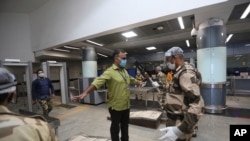Media watchdog group Reporters Without Borders, RSF, says the coronavirus pandemic has helped to curb press freedom and spread disinformation, with a shrinking number of countries offering favorable environments for journalism.
Reporters Without Borders’ latest Press Freedom Index offers little good news about the state of today’s media. While it shows little change from last year, the overall indicator of world press freedom has dropped significantly in recent years.
The Nordic countries, along with Costa Rica, are again high up on the index, with Norway ranked first for the fifth year running. North Korea again placed last, at 180, with Turkmenistan, China and Djibouti right behind.
Significantly, RSF found, the coronavirus pandemic has helped to exacerbate repression.
Pauline Ades-Mevel is a spokeswoman for the group.
"This year’s index, which evaluates the press freedom in 180 countries, shows that journalism — which is arguably the best vaccine against the virus of disinformation — is totally blocked or seriously blocked in some countries, and they are three-quarters (of those) we monitor throughout the world,” Mevel said.
In Brazil and Venezuela, ranked 111th and 148th respectively, leaders promoted unproven COVID-19 remedies and false claims about the virus. Still, RSF notes, they were debunked by investigative reporters.
In countries like Iran, Egypt and Algeria, authorities cracked down on journalists — in some cases, RSF said, to cover up high COVID-19 tolls. Ades-Mevel says other governments repressed journalists for different reasons.
"Even though there were lockdowns throughout the world, journalists were more attacked on the ground, those covering demonstrations, those covering on the ground were arrested more often, " Mevel said.
Western Europe and North America fare best in the index. Even so, Germany—where RSF noted journalists were attacked last year by extremists and conspiracy theorists— slipped a place. That’s shrunk the watchdog’s so-called ‘white zone,” offering good conditions for journalists, to just a dozen countries.
RSF also flagged worrying trends in the Americas — where press freedom deteriorated overall—especially in the United States. Some US media picked up fake news about the virus, although others discredited it, and 2020 saw an uptick in the numbers of journalists assaulted or arrested.
Africa offered a mixed picture. Burundi, Sierra Leone and Mali climbed in the press freedom index. But Ethiopia, mired in conflict in its Tigray region, dropped two places, to 101.




